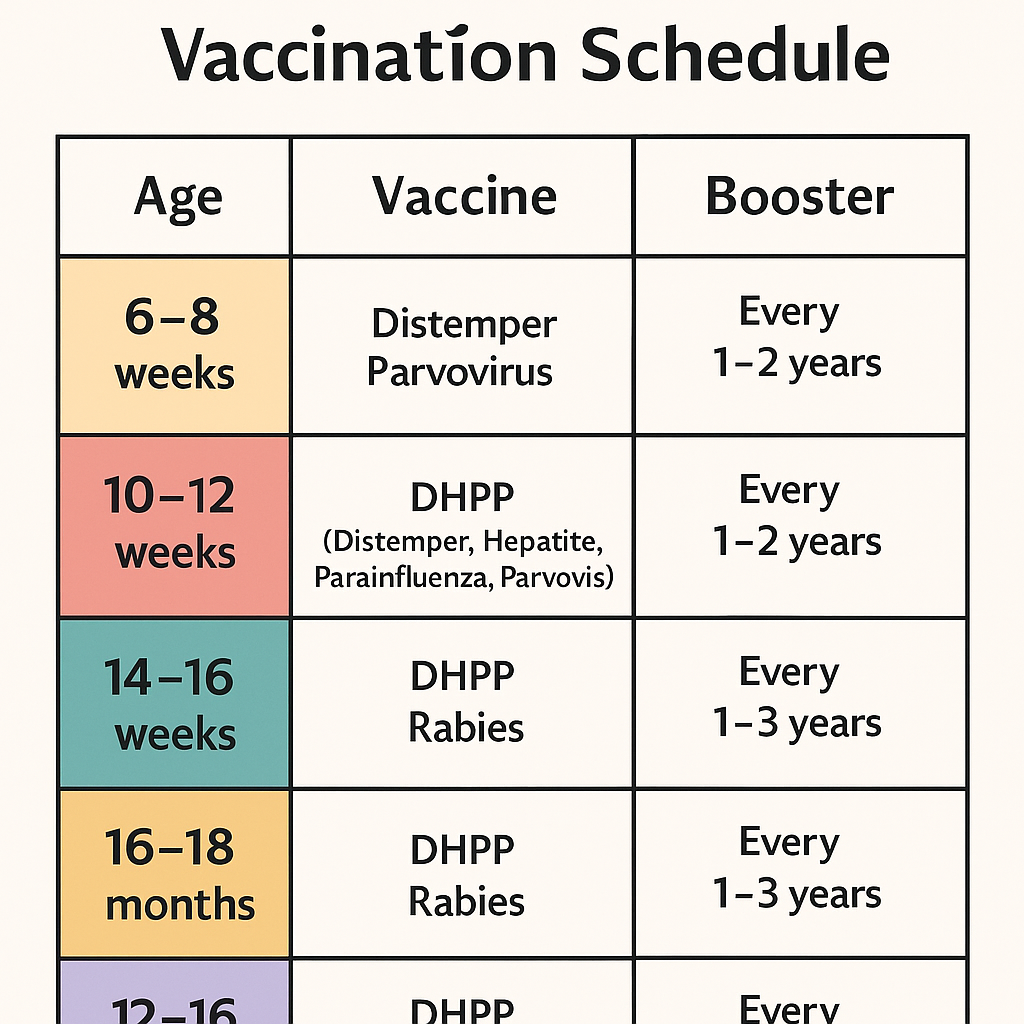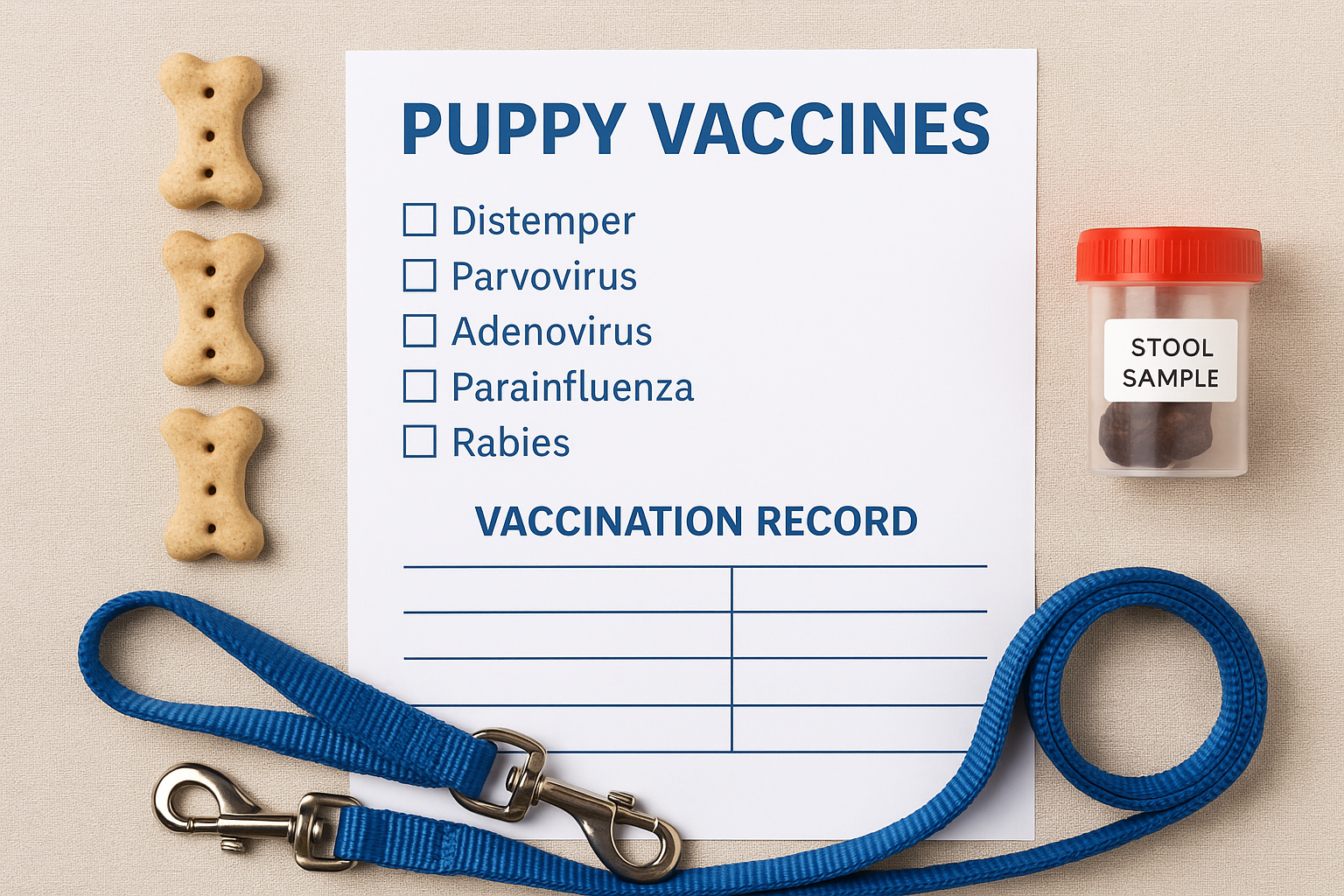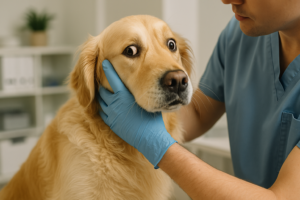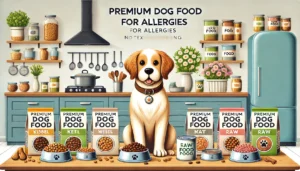Medical disclaimer: This article is for informational purposes only and does not substitute professional veterinary advice. Please consult your veterinarian for guidance tailored to your puppy’s specific needs.
Keeping your puppy safe starts with a solid vaccine plan.
I’ve seen too many preventable illnesses from parvovirus to kennel cough simply because a puppy missed a vaccine. As a Canadian veterinarian, I guide pet owners through the puppy vaccination schedule every day. With the right timing, most of these serious diseases can be prevented. Whether you’ve just adopted a wiggly 8-week-old or rescued an older pup with no records, this guide has you covered.
Let’s walk through the full puppy vaccination schedule for 2025, including what’s core, what’s optional, how much it costs in Canada, and what to expect at each stage.
🐾 Key Takeaways: Puppy Vaccination Schedule 2025
- Start early: Begin your puppy’s vaccination schedule between 6–8 weeks of age, with boosters every 2–4 weeks until 16–20 weeks.
- Core vs. non-core: Core puppy vaccines like DHPP and rabies are essential. Non-core dog vaccines, such as Bordetella or Lyme, depend on your puppy’s lifestyle and exposure risks.
- Vet visit checklist: Bring records, ask about side effects, and discuss your pet vaccination schedule at each visit.
- Costs vary: In Canada, expect to pay $75–$200 for the full series, with some clinics offering lower-cost options.
- Health = protection: Staying on schedule helps prevent life-threatening illnesses and ensures legal compliance, especially for the rabies vaccine for puppies.
Table of Contents
Why Following a Puppy Vaccination Schedule Matters
Every week, I treat puppies who missed key vaccines. One case still sticks with me: an 11-week-old golden retriever who came in lethargic, vomiting, and dehydrated. Tests confirmed parvovirus—a disease that’s almost always fatal without aggressive care. Her owners didn’t realize how crucial it was to start the puppy vaccination schedule on time. Thankfully, with hospitalization and IV fluids, she pulled through. But it could’ve been prevented.
Vaccines work by training your puppy’s immune system to recognize and fight dangerous viruses and bacteria—without actually getting sick. Puppies are born with temporary antibodies from their mothers, but those fade around 6–8 weeks. That’s when the puppy vaccination schedule kicks in.
Skipping or delaying vaccines leaves your dog vulnerable during this critical window. Diseases like parvo, distemper, or even rabies don’t wait—and often spread in parks, kennels, or even on a walk around the block. That’s why a structured pet vaccination schedule is essential to a healthy start.

Core Puppy Vaccines Every Dog Needs
The puppy vaccination schedule starts with a set of core puppy vaccines—those recommended for every dog, regardless of breed or lifestyle. These diseases are either widespread, highly contagious, or deadly (often all three). They’re also the vaccines I prioritize most during a new puppy’s first few visits.
DHPP Vaccine Explained
The DHPP vaccine is a combo shot that protects against four serious illnesses:
- D – Distemper: A viral infection affecting the respiratory, gastrointestinal, and nervous systems. It’s often fatal.
- H – Hepatitis (Adenovirus): Causes liver failure, bleeding disorders, and eye damage.
- P – Parvovirus: An extremely contagious virus that causes severe vomiting, diarrhea, and often death in puppies.
- P – Parainfluenza: A contributor to kennel cough and respiratory infections.
This vaccine is typically given every 2–4 weeks between 6 and 16–20 weeks of age. I always explain to clients that while it’s one shot, it covers multiple threats.
Rabies Vaccine for Puppies
The rabies vaccine for puppies isn’t just essential—it’s legally required across Canada. Rabies is a fatal virus that affects the brain and nervous system and can be transmitted to humans through bites. In most provinces, puppies must receive their first rabies vaccine at 12–16 weeks, followed by boosters every 1–3 years.
Even if your puppy stays indoors, skipping this vaccine isn’t an option. Wildlife exposure can happen through a cracked window or back porch—I’ve seen it.
Non-Core Dog Vaccines: When and Why They’re Needed
While core vaccines are part of every puppy vaccination schedule, non-core dog vaccines are given based on your pup’s lifestyle, environment, and risk factors. I always discuss these options with clients during their first few visits, especially if they frequent dog parks or travel frequently.
Common Non-Core Dog Vaccines in Canada
- Bordetella (Kennel Cough): Recommended for social pups—those attending daycare, grooming, or training classes. This bacterial infection spreads through airborne droplets.
- Leptospirosis: This bacterial disease spreads through contaminated water and urine from wildlife like raccoons and skunks. It can cause liver and kidney failure. In Ottawa and other urban-rural areas, I often recommend it.
- Lyme Disease: Spread by black-legged ticks, it causes joint pain, fever, and lethargy. If your puppy walks in wooded or grassy areas, especially in Eastern Ontario or BC, this vaccine is a smart addition.
- Canine Influenza: Recommended if there’s an outbreak in your area or your dog travels to high-risk places like shelters or large boarding facilities.
- Coronavirus (CCoV): Less commonly used, but sometimes added in boarding-heavy environments.
Choosing What’s Right for Your Puppy
During your first few vet visits, we’ll look at your puppy’s age, breed, travel habits, and environment. I use this info to personalize your puppy vaccination schedule, deciding which non-core dog vaccines add real protection—and which ones can be skipped.
Complete Puppy Vaccination Chart by Age
The timing of each vaccine matters. The goal of a structured puppy vaccination schedule is to build immunity at the right time—after maternal antibodies fade but before exposure risk peaks. Below is the standard Canadian puppy vaccination chart I use in my practice.
🗓️ Puppy Vaccination Chart
| Puppy’s Age | Core Puppy Vaccines | Non-Core Dog Vaccines (if risk applies) |
|---|---|---|
| 6–8 weeks | DHPP (1st dose: distemper, hepatitis, parvo, parainfluenza) | Bordetella (kennel cough) |
| 10–12 weeks | DHPP (2nd dose) | Bordetella, Leptospirosis, Lyme, Influenza |
| 14–16 weeks | DHPP (3rd dose) + Rabies vaccine for puppies | Leptospirosis, Lyme, Bordetella (booster), Influenza |
| 12–16 months | DHPP booster + Rabies booster | Coronavirus, Lyme, Leptospirosis, Bordetella (if needed) |
| Every 1–2 years | DHPP booster (per vet recommendation) | Non-core boosters as needed (based on exposure/lifestyle) |
| Every 1–3 years | Rabies booster (per local law) | — |
💡 This puppy vaccination chart is a general guideline. Your veterinarian may tailor it to your puppy’s breed, health status, and regional risks.
Why Boosters Matter
Each booster strengthens your puppy’s immune response. I often compare it to building a wall: each shot adds another brick. Without the full series—especially for DHPP and the rabies vaccine for puppies—your pup remains vulnerable.
I also encourage owners to keep a printed copy or use the AKC’s free downloadable vaccine tracker (PDF) for easy record keeping.

How to Handle Missed Puppy Vaccines
Life happens—sometimes a puppy gets sick, you’re out of town, or something slips through the cracks. But missing a vaccine doesn’t mean you have to start over. As a vet, I help pet owners adjust their puppy vaccination schedule all the time.
What to Do If You Miss a Dose
- Within 2 weeks of the due date: We usually just continue the schedule. The immune system still recognizes the last dose.
- Over 4 weeks late: Your vet may recommend restarting the series, especially if it’s early in the schedule (before the 16-week mark).
- Rabies laws: These are non-negotiable. If your puppy missed their rabies vaccine for puppies, it must be rescheduled immediately to comply with provincial regulations.
What If You Adopted a Puppy With No Vaccine Records?
I’ve had clients adopt puppies from shelters or backyard breeders with zero paperwork. In these cases, we usually treat the puppy as unvaccinated and start a new puppy vaccination schedule from scratch. It’s safer to repeat a vaccine than assume immunity.
Canadian Vaccine Costs: What to Expect in 2025
One of the first questions I hear from new pet parents is: “How much will all these shots cost?” The good news is, most clinics offer bundled puppy plans, and some shelters or non-profits provide affordable options. Below is a breakdown of what the full puppy vaccination schedule typically costs across Canada in 2025.
💰 Typical Cost of Puppy Vaccines in Canada
| Vaccine or Package | Estimated Cost (CAD) |
|---|---|
| DHPP (per dose) | $60 – $85 |
| Rabies vaccine for puppies | $20 – $30 |
| Bordetella | $25 – $45 |
| Leptospirosis | $30 – $50 |
| Lyme disease | $35 – $55 |
| Canine influenza | $40 – $60 |
| Full vaccine series (core only) | $150 – $200 (3–4 visits) |
| With lifestyle (non-core) vaccines | $250 – $350 (complete series) |
| Annual booster visit | $100 – $180 |
💡 Many clinics offer “puppy wellness packages” or memberships (like PetSmart Vet Services or Pumpkin Pet Insurance’s wellness add-ons) that reimburse vaccine costs up to $150–200 annually.
Low-Cost Options
- SPCAs & Humane Societies: Often host low-cost vaccine clinics.
- Vet Schools: Some, like the Ontario Veterinary College, offer discounted services via teaching hospitals.
- Mobile Clinics: Available in some urban centers, offering basic pet vaccination schedules at lower rates.
Before skipping a shot for budget reasons, ask your vet about bundling, delayed payment, or community options—we want your puppy protected.
5-Minute Home Checklist Before Each Vet Visit
Getting your puppy ready for vaccines doesn’t need to be stressful. Here’s a quick prep list I give to first-time pet parents to keep every puppy vaccination schedule visit smooth and stress-free.

✅ Home Checklist for Puppy Vaccine Appointments
- Bring your vaccine records
Whether it’s a paper record, email from the breeder, or your phone’s Notes app—your vet needs to track timing for each vaccine dose. - Don’t forget a fresh stool sample.
Many clinics check for worms during vaccine visits. Bring a baggie-sized sample from the same day (not frozen). - Use a secure collar or harness.
Wiggly puppies often slip leashes—use a properly fitted collar or harness with ID tags. - Pack treats and a blanket.
A familiar blanket and tasty rewards help comfort anxious pups during exams and injections. - Write down any questions.
Unsure about the DHPP vaccine explained last time? Not sure if Bordetella is needed? Keep a short list of concerns to ask during the appointment. - Avoid feeding right before the visi.t
A slightly empty stomach reduces the risk of motion sickness if you’re driving and helps if sedation is needed.
Preparing just a few minutes before can make a big difference in your puppy’s comfort and your vet’s ability to deliver safe, on-time vaccines.
When It’s Safe to Go Outside and Socialize
Every puppy owner wants to know: “When can my puppy go out and meet other dogs?” The answer depends on where they are in their puppy vaccination schedule.
🐾 When Can Puppies Go Outside?
- After the first DHPP dose (6–8 weeks): Short, low-risk outings like backyard time or carried walks are fine.
- After second dose (10–12 weeks): Introduce new sounds, sights, and smells with limited dog contact. Avoid dog parks or pet stores.
- After full core series (16–20 weeks): It’s safe to explore freely, go to puppy class, and meet other fully vaccinated dogs.

Vet-Recommended Socialization Tips
- Use a puppy stroller or backpack: It keeps paws off contaminated ground but allows safe exposure to busy streets, parks, or vet offices.
- Arrange “puppy playdates”: Invite friends with vaccinated dogs into your yard. Safe socialization helps avoid behavior problems later on.
- Avoid high-traffic areas: Until the full series is complete, stay away from pet store floors, dog parks, and boarding kennels.
Skipping socialization entirely can cause anxiety and reactivity. I always reassure clients: it’s about smart exposure, not isolation. Just make sure their puppy vaccination schedule is on track before letting them roam.
Titer Testing and Booster Shots Explained
Once your puppy completes their initial puppy vaccination schedule, many pet owners wonder how often boosters are needed—or if they’re needed at all. This is where titer testing can help.
What Is a Titer Test?
A titer test checks your dog’s blood for antibodies against diseases like distemper or parvovirus. If levels are high, your puppy may not need a booster right away.
- ✅ Useful for core puppy vaccines (like DHPP)
- ❌ Not valid for rabies in Canada—boosters are required by law regardless of titer
Titer testing is often used for adult dogs, especially those with a history of vaccine reactions or autoimmune conditions. It’s not commonly used during the initial pet vaccination schedule but can help reduce unnecessary vaccines later in life.
When Are Boosters Required?
- DHPP: Booster at 12–16 months after puppy series, then every 1–3 years depending on vet advice.
- Rabies vaccine for puppies: First booster at 1 year, then every 1–3 years per provincial law.
- Non-core dog vaccines: May require annual boosters, especially for Bordetella or Leptospirosis.
In my clinic, we discuss titers during annual exams. For many clients, it’s peace of mind and a way to customize care based on real immunity—not just a date on the calendar.
Prevention Tips to Stay on Track
A complete puppy vaccination schedule only works if it’s followed consistently. Here are practical strategies I share with clients to avoid missed shots and make preventive care easier.
🗓️ How to Stay Organized
- Set reminders: Use your phone calendar or a pet health app like Pawtrack or PetDesk to log vaccine dates.
- Ask for a vaccine schedule printout: Most clinics (including mine) provide a take-home sheet or fridge magnet with due dates.
- Book the next visit before leaving the clinic: Secure your puppy’s spot and avoid last-minute gaps.
Bundle Preventive Care
- Combine vaccine visits with parasite control: It’s efficient and lets your vet track overall health.
- Microchipping and nail trims: Great to do while your puppy’s still in the habit of regular visits.
What to Avoid
- Delays over 4 weeks between vaccine doses
- Skipping boosters after 1 year
- Vaccinating a sick or lethargic puppy: Always call your vet if your pup isn’t feeling well on vaccine day
Keeping your puppy vaccination schedule up to date protects not only your dog but also other pets—and even people—through community immunity.
Puppy Vaccination FAQs
These are the most common questions I hear from new pet parents about their puppy vaccination schedule—and the answers I share during clinic visits.
1. What age do puppies get their first vaccine?
Most puppies start at 6 to 8 weeks of age. The first shot is usually DHPP, followed by a series every 2–4 weeks until 16–20 weeks.
2. Can my puppy skip any shots?
Core puppy vaccines should never be skipped—they’re essential. Non-core dog vaccines may be optional depending on your puppy’s risk. Your vet will help personalize the plan.
3. What if my puppy had a vaccine reaction?
Mild reactions like soreness or sleepiness are normal. If there’s swelling, vomiting, or collapse, call your vet immediately. Future vaccines may need to be spaced out or given with medication.
4. Is the rabies vaccine for puppies required in all provinces?
Yes. Rabies vaccination is legally required across Canada, usually starting between 12–16 weeks. Boosters are also mandatory, often every 1–3 years.
5. What if I adopted a puppy with no records?
If there’s no proof of previous vaccines, vets typically restart the puppy vaccination schedule to ensure protection.
6. Can I vaccinate my puppy myself at home?
Not recommended. Vaccines require correct storage, dosing, and sterile technique. Plus, only licensed vets can issue rabies vaccine certificates legally recognized in Canada.
Sources and References
To ensure this guide reflects the most current veterinary standards for the puppy vaccination schedule, we consulted the following trusted sources:




